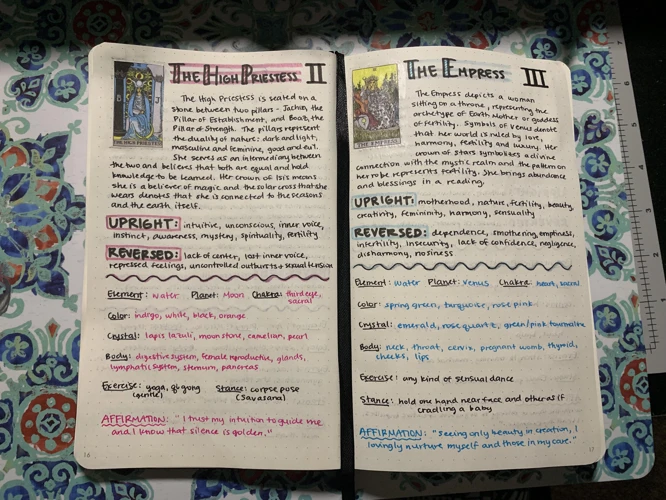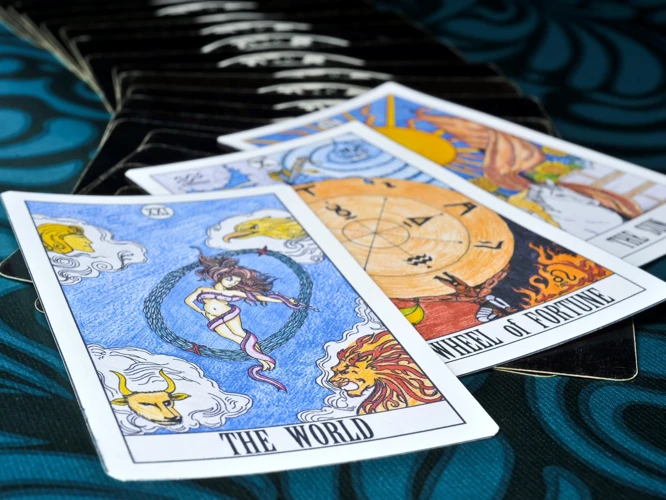There is a mysterious force within all of us, guiding us towards the right path, and helping us make decisions with clarity and confidence. This force is our intuition, an innate ability that can be honed and strengthened through specific exercises. In this article, we will explore four exercises that will empower you to tap into your intuition and unleash its full potential. From the tranquil practice of meditation to the power of visualization, we will delve deep into each exercise, providing step-by-step guidance to help you cultivate a stronger connection with your inner knowing. So, let us embark on this intriguing journey of self-discovery and unlock the hidden treasures of intuition.
Contents
- Exercise 1: Meditation
- Exercise 2: Journaling
- Exercise 3: Visualization
- Exercise 4: Trusting Your Gut
- Conclusion
-
Frequently Asked Questions
- Q: Can anyone strengthen their intuition through these exercises?
- Q: How often should I meditate to strengthen my intuition?
- Q: Can journaling really enhance intuition?
- Q: What if I have trouble visualizing during the visualization exercises?
- Q: How can I differentiate between intuition and fear?
- Q: Can I rely solely on my intuition for decision-making?
- Q: Can intuition help in my personal relationships?
- Q: What if my intuition guides me in a direction that seems unconventional?
- Q: How long does it take to develop a strong intuitive connection?
- Q: Can I enhance my intuition in other ways apart from these exercises?
- References
Exercise 1: Meditation

Meditation is a powerful practice that can greatly enhance your intuition. It provides a space for you to quiet your mind, connect with your inner self, and tap into the depths of your intuition. By setting aside dedicated time for meditation, you create an opportunity to cultivate mindfulness and develop a heightened awareness of your thoughts and feelings. Through regular meditation, you can cultivate a sense of inner calm and clarity, allowing your intuition to surface and guide you in making decisions. To begin, find a quiet and comfortable space to sit or lie down. Close your eyes, take deep breaths, and focus your attention on your breath. Notice any thoughts or sensations that arise, observing them without judgment. Gradually, as you continue with your practice, you will notice an increased sensitivity to the subtle cues and whispers of your intuition. With time and persistence, meditation can become a cornerstone of your intuitive journey, providing you with a solid foundation to explore the depths of your inner wisdom.
Benefits of Meditation
Meditation offers a wide range of benefits that go beyond just strengthening your intuition. It is a practice that allows you to cultivate a sense of inner peace and overall well-being. One of the primary benefits of meditation is stress reduction. When you meditate, you enter a state of deep relaxation, which helps to calm the mind and reduce stress levels. This can have a significant impact on your overall mental and physical health. Additionally, meditation has been shown to improve focus and concentration. By training your mind to focus on the present moment, you can enhance your ability to stay focused and attentive in other areas of your life. Another benefit of meditation is increased self-awareness. Through regular practice, you become more attuned to your thoughts, emotions, and bodily sensations, allowing you to better understand yourself and your inner experiences. This heightened self-awareness can also extend to your intuition, as you become more adept at recognizing and interpreting your intuitive insights. Meditation can promote emotional well-being by helping you cultivate a greater sense of compassion, empathy, and gratitude. As you cultivate these qualities, you create a positive internal environment that supports the development and expression of your intuition. Incorporating meditation into your daily routine can have profound effects on your overall well-being, supporting not only the strengthening of your intuition but also your mental, emotional, and physical health.Can Additionally, regular meditation can create a positive feedback loop where the benefits of meditation further enhance and deepen your intuitive abilities. So, take the time to explore the world of meditation and experience the myriad of benefits it has to offer.
How to Meditate to Strengthen Intuition
To strengthen intuition through meditation, follow these steps:
1. Find a quiet and comfortable space: Choose a space where you can relax without distractions. It could be a peaceful corner in your home, a serene outdoor location, or even a designated meditation room.
2. Set a timer: Decide on the duration of your meditation session. Start with a manageable timeframe, such as 10 minutes, and gradually increase it as you become more accustomed to the practice.
3. Assume a comfortable posture: Sit in a position that allows you to be both relaxed and alert. You can sit cross-legged on a cushion or use a chair with your feet planted firmly on the ground. Maintain an upright posture to promote focus and clarity.
4. Close your eyes and focus on your breath: Take a few deep breaths to relax your body and mind. As you settle into the rhythm of your breath, let go of any tension or distractions. Allow your attention to rest solely on the inhalations and exhalations.
5. Notice and let go of thoughts: Thoughts will inevitably arise during meditation. Instead of getting caught up in them, observe them with detachment. Acknowledge their presence, let them go, and gently redirect your focus back to your breath.
6. Cultivate mindfulness: As you continue to breathe and let go of thoughts, bring your awareness to the present moment. Notice the sensations in your body, the sounds around you, and any emotions that may arise. Maintain an attitude of curiosity and non-judgment.
7. Visualize a calming image or mantra: To enhance the meditative experience, you can visualize an image that brings you peace or repeat a calming mantra silently to yourself. This can reinforce the connection between meditation and intuition, helping you tap into your inner wisdom.
8. Practice regularly: Consistency is key when it comes to developing intuition through meditation. Aim to incorporate this practice into your daily routine, even if it’s just for a few minutes at a time. Over time, you will notice a deepening of your intuitive abilities and a greater sense of clarity and inner knowing.
By incorporating these steps into your meditation practice, you can strengthen your intuition and open yourself up to a world of inner guidance and wisdom. Remember to be patient with yourself and enjoy the journey of self-discovery that meditation can offer.
Exercise 2: Journaling

Journaling is a transformative exercise that can deepen your connection with your intuition. Through the act of writing, you create a sacred space to explore your thoughts, feelings, and intuitive insights. Keeping an intuition journal allows you to reflect on your experiences and gain valuable insights about yourself. Begin by setting aside dedicated time each day to sit down with your journal and write freely. Use your intuition as a guide and let your thoughts flow onto the pages without judgment or inhibition. You can write about your dreams, synchronicities, or any intuitive messages you may have received. This process helps you to develop a deeper understanding of yourself and brings hidden intuitive patterns and connections to light. By regularly recording and reflecting upon your intuitive experiences, you not only strengthen your intuition but also create a record of your spiritual growth and development. So grab a pen and a journal, and let the ink be the vessel that brings your intuition to life.
Keeping an Intuition Journal
One effective way to strengthen your intuition is by keeping an intuition journal. This journal serves as a dedicated space for you to record your intuitive insights, observations, and experiences. Keeping a journal allows you to deepen your self-awareness and gain valuable insights into the patterns and themes of your intuition. To start, choose a notebook or journal that resonates with you. Set aside a few minutes each day to reflect on your intuitive experiences and write them down in your journal. It’s important to trust your instincts and jot down any intuitive hunches, gut feelings, or synchronicities that occur throughout your day. Additionally, you can use your intuition journal to ask yourself questions and explore your inner guidance. By regularly documenting your intuitive experiences, you create a tangible record of your growth and progress on your intuitive journey. Reflecting on past entries can also help you uncover recurring symbols, themes, or patterns that may provide deeper insights into your intuitive abilities. So, grab your journal and pen, and allow the wisdom of your intuition to flow onto the pages. Your intuition journal will become a sacred space of self-discovery and transformation.
Techniques to Enhance Intuitive Writing
One powerful way to strengthen your intuition is through intuitive writing. This practice involves allowing your thoughts and ideas to flow freely onto paper without any filters or judgment. Here are a few techniques to enhance your intuitive writing:
1. Free Writing: Set aside dedicated time to sit with a pen and paper, or at your computer, and just let yourself write without any specific agenda. Start with a prompt or question related to what you’re seeking guidance on. Allow your thoughts to flow naturally, without worrying about grammar or coherence. Simply write whatever comes to mind, even if it seems unrelated or nonsensical. Trust that your intuition will guide your pen, revealing insights and wisdom along the way.
2. Stream of Consciousness: Similar to free writing, this technique involves continuously writing without pause or editing. Instead of focusing on a particular prompt, allow your thoughts to stream onto the page. Write down whatever comes to mind, including sensations, images, and emotions. This process can help you access deeper layers of your intuition, uncovering hidden messages and insights.
3. Automatic Writing: This technique involves entering a meditative state and allowing your hand to move freely across the page. Focus on a specific question or intention, and then relax your mind and body. Let go of any conscious control and allow your intuition to guide your hand. As you write, you may notice words or phrases that appear seemingly out of nowhere. Pay attention to these messages, as they could hold valuable guidance from your intuition.
By practicing these techniques regularly, you can enhance your intuitive writing skills and deepen your connection with your inner wisdom. Remember, the key is to suspend judgment and allow the words to flow naturally. Intuitive writing can serve as a powerful tool for self-reflection, problem-solving, and gaining clarity on your path. Trust in the process and embrace the insights that emerge from your intuitive writing practice.
Exercise 3: Visualization

Visualization is a powerful tool that can greatly enhance your intuition by harnessing the power of the mind. It involves using your imagination to create vivid mental images of scenarios, experiences, or desired outcomes. By engaging in regular visualization exercises, you can strengthen your intuitive abilities and tap into the wisdom of your subconscious mind. To begin, find a quiet and comfortable space where you won’t be disturbed. Close your eyes and take a few deep breaths to relax your body and calm your mind. Then, visualize a situation or question that you would like intuitive guidance on. See the details of this scene in your mind’s eye, using all of your senses to make it as vivid as possible. Allow your intuition to guide the imagery and notice any thoughts, emotions, or sensations that arise. Trust the information that comes through during your visualization, as it can provide valuable insights and guidance. Whether you are visualizing a peaceful setting, an upcoming decision, or your future self, this practice can strengthen your intuitive connection and support your overall well-being.
Harnessing the Power of Visualization
Harnessing the power of visualization is a potent technique to strengthen your intuition. Visualization involves using your imagination to create vivid mental images that reflect your desires and intentions. By picturing your goals or desired outcomes with clarity and detail, you engage your subconscious mind and align your energy with the manifestation of your desires. To harness this power, find a quiet and comfortable space where you won’t be disturbed. Close your eyes and take a few deep breaths to center yourself. Start by visualizing a scenario or situation that you would like to manifest. See it in your mind’s eye as if it is already happening, using all your senses to bring the image to life. Feel the emotions associated with the desired outcome and immerse yourself fully in the experience. Visualize the details, colors, sounds, and even smells that make it feel more real. The more vivid and detailed you can make your visualization, the stronger the connection you will establish with your intuition. Visualize this desired outcome regularly, perhaps as part of a daily practice. With time and consistent effort, you will discover the power of visualization to align your intuitive guidance and make your intentions a reality. (Link: Enhancing Intuition: Meditation and Mindfulness)
Visualization Exercise for Intuition
Visualization is a powerful technique that can strengthen your intuition by creating vivid mental images that align with your desires and intentions. To practice the Visualization Exercise for Intuition, find a quiet and comfortable place where you can relax and focus. Close your eyes and take a few deep breaths to calm your mind. Begin by visualizing a situation or scenario in which you would like to receive intuitive guidance. It could be a decision you need to make, a problem you’re trying to solve, or a goal you’re striving to achieve. Imagine yourself in that situation, engaging your senses to make the visualization as realistic as possible. Notice the colors, sounds, smells, and textures associated with the scenario. As you immerse yourself in this mental imagery, pay attention to any intuitive insights, gut feelings, or subtle nudges that arise. Trust your intuition and believe that the answers and guidance you seek are within you. Repeat this visualization exercise regularly to strengthen your intuitive connection and gain clarity in decision-making. By engaging your imagination and tapping into the power of visualization, you can unlock the full potential of your intuition and harness it for your personal growth and success.
Exercise 4: Trusting Your Gut
Trusting your gut is an essential aspect of strengthening your intuition. Your gut feelings, also known as instinct or intuition, are those subtle sensations that arise within you, guiding you towards the right path. To develop this trust, it’s important to recognize and honor your gut feelings. Pay attention to those moments when you have a strong sense or a “gut reaction” about something. Instead of dismissing or ignoring it, take the time to acknowledge and listen to it. Reflect on past experiences where your gut feeling proved to be accurate or beneficial. This will help build confidence in your intuition. Additionally, practical tips such as practicing self-care, managing stress, and surrounding yourself with positive influences can also contribute to developing a trusting relationship with your gut instincts. Remember, your intuition is a valuable resource that can provide valuable insights into making the right decisions for your life’s journey. Don’t hesitate to follow its guidance. Trust your gut, and it will lead you towards a more intuitive and fulfilled existence.
Recognizing and Honoring Your Gut Feelings
Recognizing and honoring your gut feelings is a crucial aspect of strengthening your intuition. Gut feelings are those subtle sensations or inner nudges that arise from your deep intuitive knowing. They often manifest as a sense of unease, a feeling of excitement, or a strong conviction about a particular course of action. To recognize your gut feelings, it’s important to develop self-awareness and pay attention to the physical and emotional sensations that arise in your body. These sensations may include a tightness in your stomach, a racing heart, or a sense of calm and clarity. Trusting your gut feelings means honoring them and giving them the value they deserve. This involves acknowledging that your intuition holds wisdom and insights that can guide you. It may require letting go of logic and analysis and embracing the subtle, intuitive messages that arise within you. To strengthen your trust in your gut feelings, start by reflecting on past experiences where you followed your intuition and it led you to positive outcomes. This will help build confidence in your intuitive abilities. Remember, your gut feelings are like a compass guiding you towards the right path, and by recognizing and honoring them, you can navigate through life with greater clarity and authenticity. If you’d like to dive deeper into understanding the role of intuition, you can explore the fascinating field of psychology and parapsychology.
Practical Tips to Develop Intuitive Trust
Developing trust in your intuition is an essential step towards harnessing its power. Here are some practical tips to help you cultivate intuitive trust:
1. Start with small decisions: Begin by trusting your intuition in smaller, low-stakes decisions. This could be as simple as choosing what to wear or where to go for lunch. By observing the outcomes of these decisions, you can gain confidence in your intuitive guidance.
2. Keep an intuition journal: Journaling about your intuitive experiences can help you track patterns and validate your intuition over time. Write down any hunches, gut feelings, or intuitive insights you have, along with the outcome or realization that follows. This will provide tangible evidence of the accuracy and reliability of your intuition.
3. Practice active listening: Pay attention to your body’s subtle signals and reactions when faced with different situations or choices. These physical sensations can be indicators of intuitive guidance. Learn to listen to your gut feelings, as they often carry valuable information.
4. Seek affirmations: Surround yourself with positive influences and like-minded individuals who support and validate your intuitive experiences. Share your intuitive insights with trusted friends or seek guidance from mentors who have experience in intuitive development.
5. Embrace mistakes as learning opportunities: Understand that developing intuitive trust involves making mistakes along the way. Embrace these mistakes as valuable learning opportunities and use them to fine-tune your intuitive abilities.
6. Stay grounded: Grounding practices, such as spending time in nature, practicing mindfulness, or engaging in physical activities, can help you stay centered and connected to your intuition. When your mind and body are in balance, it becomes easier to access and trust your intuitive guidance.
By incorporating these practical tips into your daily life, you can strengthen your intuitive trust and develop a deep, unwavering connection with your inner wisdom. Trusting your intuition opens doors to new insights, opportunities, and a greater sense of alignment and purpose in your life.
(internal link: /role-intuition-psychic-readings/)
Conclusion
In conclusion, strengthening your intuition is a transformative journey that requires dedication and consistent practice. Through the four exercises outlined in this article—meditation, journaling, visualization, and trusting your gut—you can unlock the incredible power of your intuition. Meditation provides a space for quieting the mind and connecting with your inner self, allowing intuitive insights to surface. Journaling helps you capture and reflect upon your intuitive experiences, deepening your understanding and connection with your inner voice. Visualization allows you to harness the power of imagination, creating vivid mental images that can guide your intuitive decision-making. Finally, trusting your gut involves recognizing and honoring your gut feelings, learning to decipher their messages, and cultivating self-trust. By integrating these exercises into your daily life, you can enhance your intuition and gain access to valuable guidance and wisdom. Remember, intuition is a skill that can be developed and honed with practice, so embrace the journey and trust in the innate wisdom that resides within you. Trust yourself, listen to the whispers of intuition, and embark on a path of self-discovery and empowerment. The possibilities are limitless when you tap into the true power of your intuition.
Frequently Asked Questions
Q: Can anyone strengthen their intuition through these exercises?
A: Yes, absolutely! These exercises are designed to be accessible to everyone, regardless of their current level of intuition. With dedication and practice, anyone can strengthen their intuitive abilities.
Q: How often should I meditate to strengthen my intuition?
A: It is recommended to start with a few minutes of meditation every day and gradually increase the duration as you become more comfortable. Consistency is key, so aim for a daily practice that suits your schedule.
Q: Can journaling really enhance intuition?
A: Absolutely! Journaling provides a space for self-reflection and introspection, allowing you to tap into your intuitive thoughts and feelings. It helps uncover patterns and insights that may have otherwise gone unnoticed.
Q: What if I have trouble visualizing during the visualization exercises?
A: Visualization is a skill that can be developed with practice. If you encounter difficulties, start with simple images or guided visualizations. Over time, your ability to visualize will improve.
Q: How can I differentiate between intuition and fear?
A: Intuition often feels calm and centered, while fear is accompanied by anxious thoughts and feelings. Trust your gut instincts and pay attention to the sensations in your body to discern between the two.
Q: Can I rely solely on my intuition for decision-making?
A: While intuition is a valuable tool, it is recommended to use a balance of intuition and logical reasoning when making important decisions. Combining both approaches can lead to well-rounded choices.
Q: Can intuition help in my personal relationships?
A: Absolutely! Intuition can provide insights into your relationships, helping you better understand others and make more informed decisions about the connections in your life.
Q: What if my intuition guides me in a direction that seems unconventional?
A: Trust your intuition, even if it seems unconventional. Sometimes, the greatest breakthroughs and opportunities come from following our inner guidance, even if it goes against the grain.
Q: How long does it take to develop a strong intuitive connection?
A: The time it takes to develop a strong intuitive connection varies for each individual. It depends on factors such as dedication, practice, and willingness to trust and listen to your intuition. Be patient and allow the process to unfold naturally.
Q: Can I enhance my intuition in other ways apart from these exercises?
A: Absolutely! These exercises are just a starting point. Other techniques, such as energy work, psychic readings, and exploring the realms of parapsychology, can also contribute to the development and enhancement of intuition.







